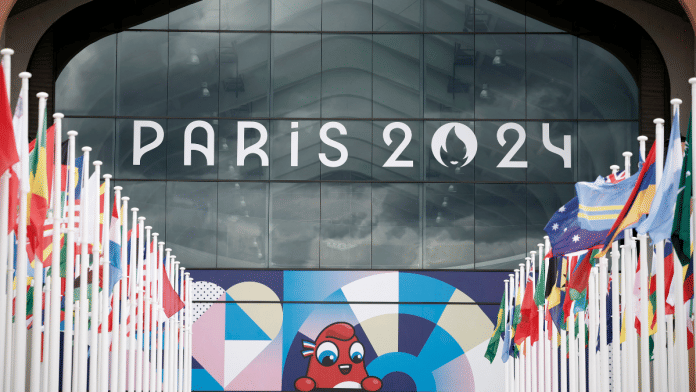New Delhi: Indian wrestler Antim Panghal is back home from Paris after she faced disciplinary action for trying to sneak in her sister inside the Olympic Games Village.
The issue arose when Panghal gave her official accreditation to her younger sibling, leading to a major breach of rules and resulting in her entire entourage being expelled from the games village.
“The Indian Olympic Association has decided to fly wrestler Antim and her support staff back after a disciplinary breach was brought to IOA’s notice by the French authorities,” the IOA said in an official statement.
Luana Alonso, a 20-year-old swimmer from Paraguay, was also expelled from the Olympic village a few days back for creating an ‘inappropriate atmosphere’ within the Paraguayan team. This news caused a stir on social media.
ThePrint looks at the rules and restrictions that apply on athletes living in the Olympics village.
Athletes only
The first rule for accessing the Village is that only athletes are allowed to stay there, while coaches and team officials are not permitted, except in exceptional circumstances.
Athletes need to strictly reside in the quarters of their respective countries while they are allowed to socialise with their counterparts from other countries when they are not competing.
Permission must to leave village
One of the most serious rules is that athletes are not allowed to leave the village without permission. Although this rule may seem overly restrictive for athletes, the case of Brazilian swimmer Ana Carolina Vieira illustrates its enforcement. Vieira was sent home from the Paris Games, and her swimmer boyfriend Gabriel Santos received a warning, after they posted a video on social media showing themselves outside the village.
Since Tokyo 2020, there has also been a ban on political, religious, and racial propaganda. This rule applies to the village, as well as the field of play, medal ceremonies, and other official ceremonies.
Drinking, socialising not allowed
Athletes are prohibited from engaging in certain activities on Olympic Village premises, including partying, smoking, and consuming alcohol.
In fact, the Australian Olympic Commission was in news for its rules stating that athletes will have to vacate the village within 48 hours of the conclusion of their events, a move said to be implemented to crack down on the party culture of its contingent.
Athletes can decorate their zone
To maintain a lively atmosphere within the games village, athletes are encouraged to decorate their country’s zones while adhering to the established guidelines. This creative freedom allows athletes to make themselves feel at home.
While common areas have minimal décor, consisting of basic furniture like couches, dining tables, and coffee tables, athletes have the liberty to customise the interior of their apartments to their liking. Additionally, displaying national flags outside balconies helps identify each country’s zone and adds to the overall festive ambiance.
Safety for minors
Athletes under the age of 18 are permitted to stay in the Olympic Games Village, although the decision to do so is left up to each participating country. During the Tokyo Olympics, the IOC introduced chaperones for athletes under 16. In Paris, rules state that minors can only be roomed with other minors.
According to The Guardian, Australia chose to accommodate its three youngest team members — 14-year-olds Arisa Trew and Chloe Covell, and 15-year-old Ruby Trew, all skateboarders — in a hotel instead of the Olympic Village, despite being part of the 460-member team.
Recent incidents, including doping scandals and age falsification, have highlighted concerns about the exploitation of young athletes.
A notable example is the case of Russian figure skater Kamila Valieva, who won gold at the 2022 Winter Olympics in Beijing at the age of 15. Valieva, who had tested positive for the banned substance trimetazidine, a heart medication, was handed a four-year ban.
Olympic village nursery
For the first time in Olympic history, a nursery is available at the Paris 2024 Games, catering to women athletes with young children. This dedicated space, located in the Olympic and Paralympic Village Plaza, is designed for infants and provides a private area for breastfeeding among others.
Notably, access to the nursery is restricted to children and their caregivers who obtain a guest pass from their National Olympic Committee (NOC), ensuring a secure and exclusive environment for these families.
Only nursing athletes are allowed to bring their infants into the Olympic Village.
Security for athletes
The Olympic Village is a hub of athletes from around the globe, including some of the world’s top performers with massive fan bases. While security support is available for high-profile athletes under exceptional circumstances, even they are not allowed to stay in the village. Instead, they are only permitted to be present at specific times, ensuring a balance between their needs and the village’s rules.
The easiest of the rules to follow in the village is the one that states that athletes are allowed to customise their own mattresses according to their requirements.
Other rules:
Dietary products are allowed to be shipped to the Olympic Village
Pets are not allowed at the Olympic village.
Unlike the Covid-struck Tokyo Olympics, there is no ‘intimacy ban’ inside the Olympic Village.
(Edited by Tony Rai)






